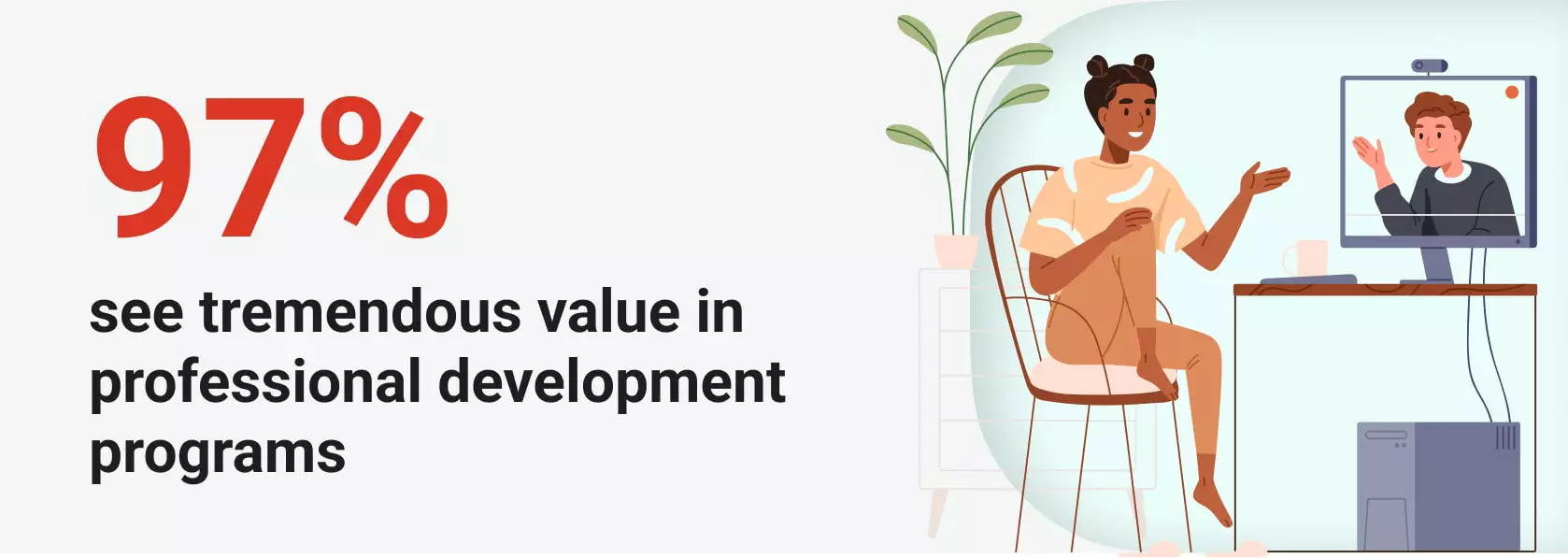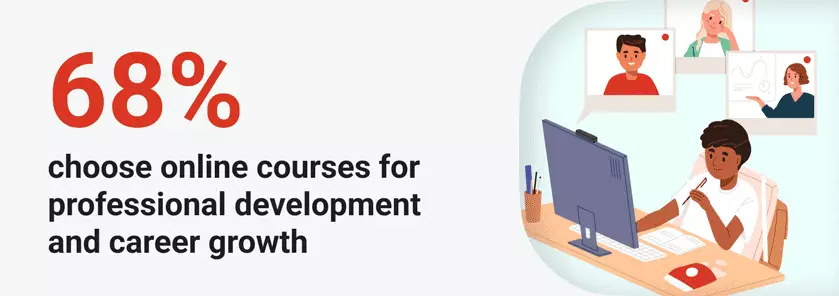Emerging IT trends shaping the future of the industry

Written by Michael Feder

Reviewed by Kathryn Uhles, MIS, MSP, Dean, College of Business and IT

The information technology (IT) industry is a continuously growing field with a rich history of innovation. It’s also projected to have a bright future. The U.S. Bureau of Labor Statistics projects much faster than average job growth for the industry between 2023 and 2033.
Thanks to its innovation, IT has arguably become the backbone of modern society. From the ways the internet transformed the way we work and communicate to today’s emerging trends in information technology — think artificial intelligence, cybersecurity, cloud computing and data analytics — the industry continues to reimagine what’s possible.
But to truly understand what opportunities are on tomorrow’s table, you have to go beyond the headlines and tech buzz. Who better to provide a glimpse into IT’s future than those working in the field? Read on for an inside look at the latest IT trends.
Key Takeaways
- AI, quantum computing, and cloud and edge computing are the top emerging technologies in 2025 according to our survey results.
- AI and blockchain were identified as the most overhyped technologies, according to those in the IT industry.
- Cybersecurity is ranked as the most technical skill, highlighting the importance of security and protection in the digital age.
- Respondents are preparing for the changes by enrolling in online courses for professional development, as well as recognize the importance of professional development programs.
- Respondents identified lack of time as the biggest roadblock to pursuing their education and training.
- IT professionals are adapting to the changes that their industry brings and preparing for upcoming technologies with training and upskilling.
IT trends survey methodology
To capture an accurate snapshot of the future of IT, University of Phoenix conducted a survey of 1,000 U.S. professionals working in the IT industry. The goal was to gather insights on how IT trends are shaping career paths and technological advancements. Accordingly, this multiple-choice survey includes the perspectives of self-employed and full-time IT employees ages 18 to 65. The resulting breadth of opinion provides an informed picture of the future trends in information technology.
A current look at a career in IT
From the widespread adoption of AI to recent spikes in cybersecurity threats , a lot is happening in IT. Beyond exploring what the future of the information technology
industry might hold, respondents in the UOPX survey were also asked about the state of the industry today.
Here’s a closer look at their sentiments on three prominent topics shaping IT: disruptive technologies, remote work and skills prioritization.
Disruptive and emerging technologies in 2025
According to survey results, the top IT trends and emerging technologies in 2025 are AI, quantum computing, and cloud and edge computing. Surveyed IT professionals held particularly interesting perspectives on the latest disruptive tech. When asked about the most overhyped technologies, for example, 37% identified AI, with blockchain following at 28%.

This sentiment highlights a gap between what the media and the public might consider the most groundbreaking technologies and what insiders actually believe. In fact, respondents identified quantum computing as the most underhyped technology, suggesting that some technologies with immense potential may not be receiving the attention they deserve.
Remote work
Remote work isn’t a bygone IT trend from the pandemic era. It’s here to stay. An overwhelming 88% of survey participants believe that remote work will remain dominant in the industry. This trend speaks to the need for IT professionals to embrace flexibility and adaptability in their careers. Remote work has become one of the defining IT trends of our time, reshaping how teams collaborate and contribute to innovation.
Skills prioritization

How IT professionals feel about prioritizing skills tells another important story. Respondents ranked cybersecurity as their roles’ most critical technical skill, driven by evolving IT trends that emphasize security and protection against threats. Protecting digital infrastructures, in other words, has become increasingly integral to their daily duties.
After cybersecurity, the most critical skills cited were data analytics, cloud and edge computing, programming, networking, AI and, finally, DevOps. All that is to say: Modern IT professionals must equip themselves with a broad range of essential skills.
The future of IT trends as predicted by IT workers
The future of information technology looks exciting, with many disruptive technologies poised to reshape the industry.
To start, programming and data analytics are undergoing significant transformations. AI is barging in as a disruptive force changing code generation, debugging and optimization. Data analytics is evolving from simple data interpretation to predictive and prescriptive analytics, and newer computers with more processing power are further accelerating this transition.
According to our survey, IT professionals share an optimistic view of the landscape ahead and identified many key trends as positive transformative forces.
Artificial intelligence (AI)
Among emerging technologies , 88% of respondents identified AI as the technology that will take center stage and dominate the industry’s future. This may come as no surprise, given how widespread this technology is across nearly all fields of the IT industry.
An overwhelming 67% of respondents predict that AI will be extremely important in shaping IT, showing how its transformative potential is already being realized and is expected to drive growth.
Yet, when it comes to adapting to the changes that AI may bring to IT roles, a minority of professionals feel fully prepared for what’s ahead. Less than one-third (29%) of respondents feel they are fully prepared to adapt to roles requiring advanced knowledge of AI.
However, most IT professionals remain optimistic about their ability to bridge the AI knowledge gap, with only 13% expressing concern about their lack of preparation. More than half (58%) reported feeling slightly prepared, highlighting the need for ongoing education and continuous learning resources.
The positive outlook on AI doesn’t stop at learning opportunities, though. No matter what challenges they might face, the vast majority (86%) of respondents remain mildly or very optimistic about the direction the industry is headed. This confidence may help explain why careers in IT continue to have a strong outlook: Innovative technologies seem to be largely viewed as opportunities by those working in the field.
Quantum computing
Quantum computing follows AI as the next technological innovation to dominate the IT industry. It could revolutionize fields like cryptography, opening up possibilities far beyond the scope of current computational capabilities.
Nearly half (44%) of respondents predict that quantum computing will disrupt traditional IT infrastructure within the next 10 years. However, 30% of survey participants remain uncertain about its exact impact, indicating that this technology’s transformative potential is still somewhat unclear. While its full potential is yet to be realized, quantum computing appears to be one of the most anticipated IT trends of the next decade.
Cybersecurity
Cybersecurity knowledge, driven by ongoing IT trends and the increasing complexity of interconnected networks, continues to be a cornerstone skill in every IT professional’s toolkit for the foreseeable future. Virtually all respondents (94%) agreed that cybersecurity will play an even larger role in the coming years.
This is no surprise, given the recent increase in malicious attacks targeting even the largest governmental agencies over the past few years. IT professionals feel a strong sense of responsibility to safeguard data and infrastructure. As technologies become more interconnected and sophisticated, this task only becomes more complex and vital.
How IT workers are preparing for upcoming shifts in the future of the IT industry
In IT, standing still is the same as moving backward. The future of IT jobs is constantly changing, and a career in IT largely depends on an ability to adapt by upskilling and reskilling.
When asked what an IT career will look like in five years, an overwhelming majority of surveyed IT professionals identified cybersecurity as a predominant IT field and agreed on the importance of continuous learning and certification courses to enhance their career prospects.
Advanced qualifications like a master’s degree in information technology are more than just valuable credentials to showcase your expertise. They can be important educational milestones that allow IT professionals to hone and learn new skills.
The survey also reveals that most IT professionals recognize that staying skilled and ready requires active learning and a forward-looking mindset.

The importance of professional development is a matter-of-fact truth for nearly all respondents, with 97% agreeing on the tremendous value of professional development programs. Certifications aren’t far behind, with 94% of survey participants acknowledging how important they are to their career prospects.
But do IT professionals feel confident that they can keep up with the pace of technological innovation? In short, yes. A solid 68% of respondents feel very or extremely confident about keeping up with technological advancements over the next five years, and only 7% do not feel confident at all. This is a testament to the importance that IT pros give to staying proactive about their learning endeavors.
So, how are IT professionals actively staying ahead of the curve?

Respondents were invited to choose more than one answer. Online courses — both free and paid — are the most popular, with 68% of respondents choosing this route. 62% rely on self-study, demonstrating the industry’s staunch reliance on independent learning. Nearly half (45%) are pursuing professional certifications, showing a serious commitment to continuous improvement.
The priority skills
Working and studying at the same time isn’t always easy, and it is paramount to know which areas of expertise to prioritize in the spirit of long-term growth. As noted, respondents were invited to choose more than one answer, resulting in a list of skills they felt were important to focus on. (That’s why numbers don’t add up to 100.)
In line with previous findings, cybersecurity is the clear front-runner when choosing where to focus. 71% of respondents felt that IT professionals seeking long-term growth should prioritize cybersecurity.
AI is next, with 59% identifying it as a key area of expertise. AI is at the forefront of innovation, so there are many IT professionals who feel it’s important to stay up to date with it.
Cloud computing isn’t far behind, rounding out the top three at 54%. This last finding is particularly interesting as it shows that established technologies that enhance scalability and flexibility never lose their perceived importance in driving business.
The message is clear: In IT, learning isn’t just an option — it’s a necessity. Successful professionals aren’t just monitoring the future of information technology — they’re actively shaping it, with curiosity as their most powerful tool.
The barriers IT workers face with upskilling and reskilling
Even if IT professionals are confident in their ability to keep up with the latest IT trends, the road to learning new technical skills is often lined with challenges. So, what are the biggest barriers to pursuing additional education and training?

According to this survey, time constraints present the biggest obstacle. Almost two-thirds (61%) of respondents cited a lack of time as the main roadblock between them and further education. This isn’t surprising, given how challenging it is for adult learners to juggle family and personal obligations with the commitments of such a demanding industry.
More than half (52%) of respondents cited the cost of further education as the second-most significant roadblock. 29% noted that a lack of employer support makes these challenges even harder to overcome. This lack of support can leave workers feeling stuck, even when motivated to grow their skill sets.
Overcoming obstacles
So, how do you break down these barriers? Online learning is one option.
Online universities can provide the flexibility and affordability adult learners need to balance their educational goals with their professional and personal responsibilities. Online programs for working adults can accommodate adult learners’ schedules, offering virtual learning options that fit in with real-world needs.
Not only that, but several universities, like University of Phoenix , also help address financial barriers
by providing students options to save time and money on their degree, making continuing education accessible at any stage of an IT career.
The future of IT is bright for those who can keep up with IT trends
There’s no denying that the IT industry’s potential is exciting, especially for those actively tracking IT trends and adapting to emerging technologies. These survey results underscore that those working in IT share this sentiment. IT professionals are optimistic about their field and are investing their time in keeping up with the latest IT trends and technological changes.
And here’s the kicker: Most of those surveyed said their companies recognize the importance of emerging technologies and are actively investing to keep pace. A majority of IT professionals (63%) report that their employers are betting on generative AI, while 45% see significant investment in digital trust and cybersecurity. Cloud and edge computing aren’t far behind, with 44% of organizations putting resources into these technologies.
There’s so much we can surmise by looking at today’s data. In the world of information technology, in other words, only one thing is certain: Change is constant.
As the UOPX survey shows, IT professionals who are willing and agile enough to roll with the changes end up feeling the most confident about the future. And the only way to adapt to even the most unexpected evolutions is to have an open mind and view learning as a never-ending process.

ABOUT THE AUTHOR
A graduate of Johns Hopkins University and its Writing Seminars program and winner of the Stephen A. Dixon Literary Prize, Michael Feder brings an eye for detail and a passion for research to every article he writes. His academic and professional background includes experience in marketing, content development, script writing and SEO. Today, he works as a multimedia specialist at University of Phoenix where he covers a variety of topics ranging from healthcare to IT.

ABOUT THE REVIEWER
Currently Dean of the College of Business and Information Technology, Kathryn Uhles has served University of Phoenix in a variety of roles since 2006. Prior to joining University of Phoenix, Kathryn taught fifth grade to underprivileged youth in Phoenix.
This article has been vetted by University of Phoenix's editorial advisory committee.
Read more about our editorial process.
Read more articles like this:


